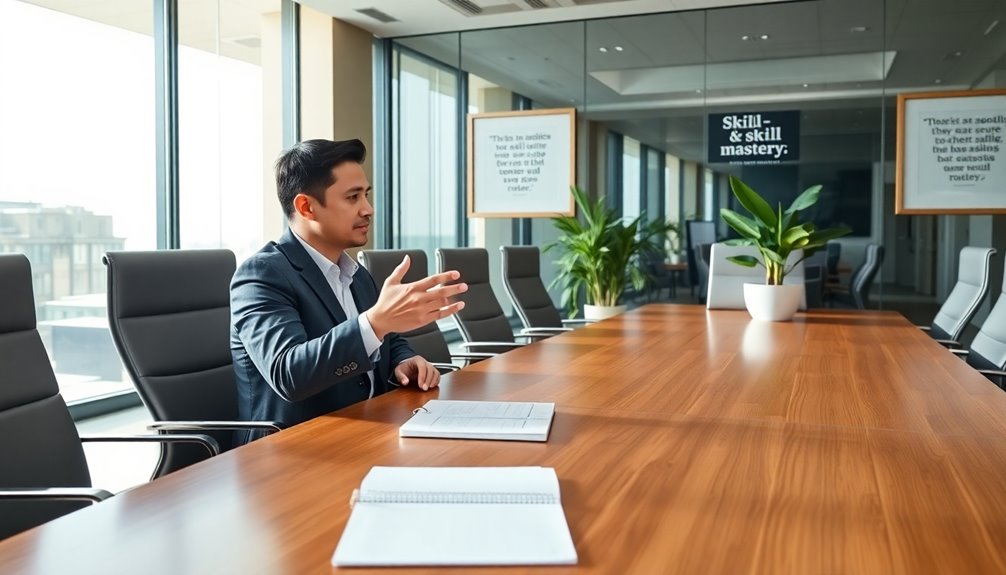Sending a thoughtful thank-you email can be your game-changer in getting quick callbacks from employers. Make sure to send it within 24 hours of your interview to keep your candidacy fresh in their minds. Use a clear subject line like "Thank you for your time, [First Name]!" and begin with a specific thank you. Mention something from your conversation that resonated with you to show genuine interest. Close with a note about looking forward to future discussions. This simple gesture demonstrates professionalism and reinforces your enthusiasm for the role. Keep going, and you'll uncover more tips to boost your chances!
Key Takeaways
- Send your thank-you email within 24 hours to keep your interview fresh in the employer's mind.
- Personalize your message by referencing specific discussions from the interview to demonstrate genuine interest.
- Use a clear and engaging subject line to ensure your email stands out in the recipient's inbox.
- Express gratitude specifically, mentioning how the interview enhanced your understanding of the role and company.
- Indicate your eagerness for future collaboration, showing ongoing interest in the position.
Importance of Thank You Emails
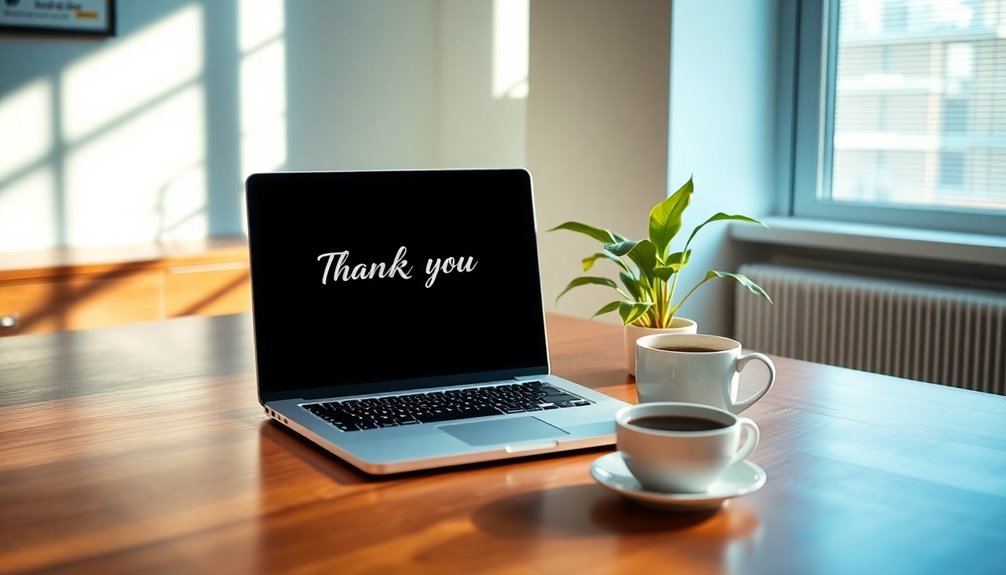
Thank you emails are crucial in the job application process, and they can greatly influence your chances of landing the position. Sending a thank-you email after your interview demonstrates courtesy and leaves a positive impression on the interviewer. It shows your enthusiasm for the job and can give you an edge over other applicants. In fact, nearly one in five interviewers have dismissed candidates who didn't send a thank-you note.
This simple gesture helps create a deeper connection with the interviewer and contributes to a more positive recruitment experience. Studies show that 68 percent of hiring managers say receiving a thank-you email impacts their decision-making process. Such an email allows you to reiterate your qualifications and reinforce any positive impressions made during the interview.
Additionally, sending your thank-you email within 24 hours of the interview reinforces your professionalism and respect for the interviewer's time. It also gives you a chance to highlight key takeaways and showcase your attention to detail, effective listening, and communication skills. Ultimately, a thank-you email reflects your professionalism, which employers highly value.
It emphasizes how your experience can bring value to the position you're seeking, making it a crucial step in your job application journey. Don't underestimate the power of this small yet significant act!
Crafting the Perfect Subject Line
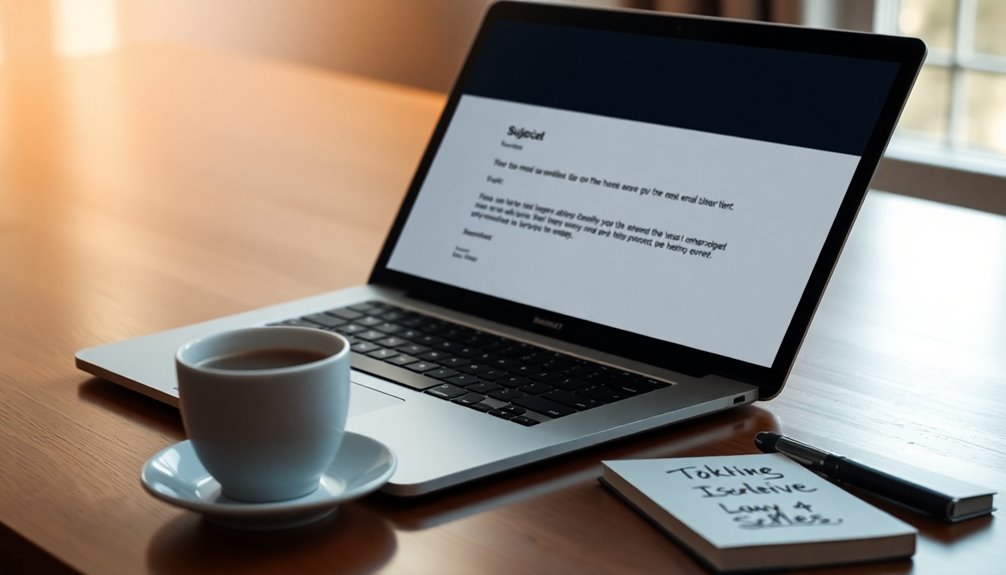
A well-crafted subject line can considerably enhance the effectiveness of your thank-you email. It's your first chance to grab attention, so make it count! Think about evoking gratitude with phrases like "Thank you for making a difference." This not only expresses appreciation but also creates a warm emotional connection. Additionally, remember that subject lines significantly affect open rates, so choosing the right words is crucial for engagement.
You can also use heartfelt expressions that emphasize the recipient's individuality. Subject lines like "Your support means the world to me!" can make them feel special. Consider sparking curiosity, too. A playful line such as "Appreciation alert! Something amazing awaits you" can entice them to open your email.
Here's a quick reference table to guide you:
| Subject Line Example | Emotional Impact |
|---|---|
| Thank you for making a difference | Evokes gratitude and appreciation |
| Your support means the world to me! | Creates a personal connection |
| Appreciation alert! Something amazing awaits you | Builds anticipation |
| Not A Marketing Email | Fun and engaging |
| Thank you for six great years | Celebrates milestones |
Crafting the perfect subject line boosts your chances of a quick response. Keep it warm, engaging, and intriguing!
Structuring Your Email Effectively

When you structure your thank-you email effectively, you not only convey your appreciation but also make it easier for the recipient to engage with your message.
Start with a clear subject line, like "Thank you for your time, [First Name]!" Keep it short and relevant, avoiding jargon that might confuse your reader.
Next, use a professional salutation. A simple "Hello" or "Dear [Recipient’s Name]" sets the right tone. If it's a more casual interaction, you might opt for "Hey there" or "Good morning/afternoon." Clearly introduce yourself and state the purpose of your email right away.
In the body, express your gratitude specifically. Mention what you appreciate, using sincere and polite language. Personalizing your message makes it more genuine. For instance, say, "I'm incredibly grateful for your support during [Project/Outcome]." Additionally, remember that including contact details can facilitate ongoing communication with the recipient.
Finally, close your email professionally with a statement like "Sincerely" or "Kind regards." Include your full name, position, and contact information to encourage future communication.
This structure not only looks professional but also invites a prompt response.
Timing Your Thank You Email
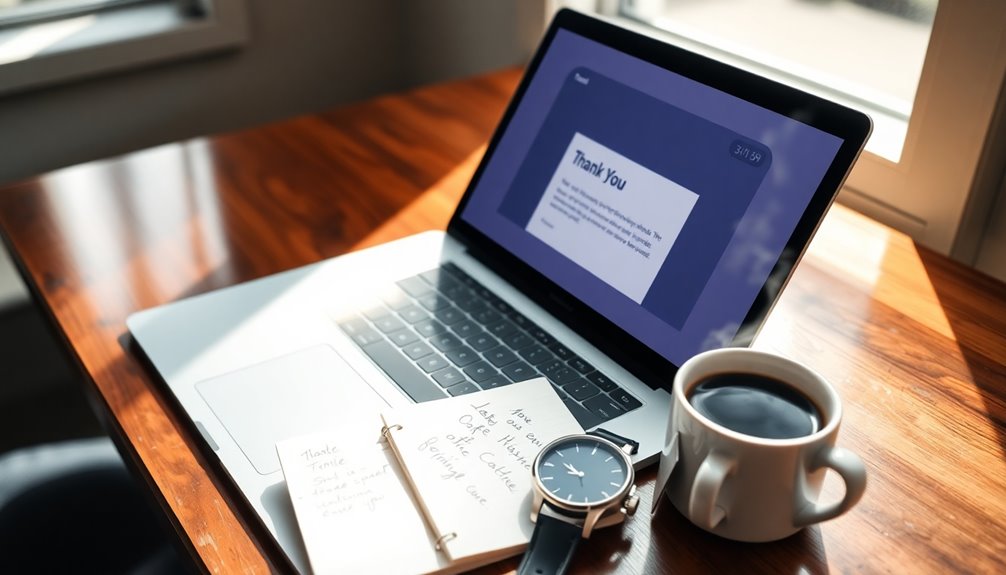
Sending your thank-you email promptly shows your enthusiasm and professionalism. Aim to send it within 24 hours of your interview to stay fresh in the interviewer's mind. Timing your email right can enhance your engagement and leave a positive impression. Additionally, sending your email quickly can alleviate employer concerns about your motivation and commitment to the role.
Importance of Promptness
Timing your thank you email is essential, as it can greatly influence the hiring decision. Sending your email promptly shows enthusiasm and keeps you fresh in the interviewer's mind. Here are some key points to take into account:
- Send your email within 24 hours of the interview to maximize impact.
- If your interview was on a Friday, send it that day so it arrives early next week.
- Aim for a quick turnaround; the sooner, the better.
- Remember, nearly 68% of hiring managers say a thank-you email affects their decisions.
- Delaying beyond 48 hours can diminish your email's effectiveness.
A prompt thank you email not only expresses gratitude but also highlights your professionalism. Failing to send one could jeopardize your chances, with nearly one in five interviewers dismissing candidates who skip this step. Additionally, it's important to personalize the letter by including details from the interview conversation, as this can reinforce your engagement and responsibility.
By being timely, you set yourself apart from others and signal your genuine interest in the position. Make sure to personalize your email by including specifics from your interview, reinforcing your engagement and responsibility.
A quick, thoughtful response can make all the difference in the hiring process!
#
Enhancing Candidate Engagement
Crafting a well-timed thank you email can greatly enhance your engagement with potential employers. To optimize the impact of your message, avoid sending it over the weekend. Interviewers often don't check their inboxes regularly during this time, so your email might get lost in the shuffle.
If your interview is on a Friday, consider waiting until Monday morning to send your note. This guarantees it's seen promptly and reflects professionalism. Post-interview thank you emails can also create a lasting positive impression on interviewers, further reinforcing your candidacy.
Timing is also significant based on when your interview occurs. If it's late on a Friday, hold off until Monday to send your email. For morning or early afternoon interviews, aim to send your thank you before the end of the business day to keep the conversation fresh in the interviewer's mind.
Allow yourself a few hours after the interview to reflect before drafting your email. This pause lets you personalize your message by mentioning key points discussed during the conversation.
When you do send the email, make certain it’s organized, concise, and free of errors. By sending it during business hours and maintaining professionalism, you’ll further enhance your engagement with potential employers. Additionally, consider including any necessary attachments or links to relevant work samples. After sending the initial email, it’s important to have a followup email strategy in place. This can include sending a polite follow-up email a week or two after your initial communication to ensure your message hasn’t been lost in the recipient’s inbox. A followup email strategy can help to keep you at the forefront of the hiring manager’s mind and demonstrate your continued interest in the position.
Key Elements to Include

A well-structured thank you email can make a significant impact, and including key elements is essential for conveying your appreciation effectively. Here are the key components you should include:
- Subject Line: Use clear, concise language. Personalize it with the recipient's name and convey appreciation, like "Grateful for your time, [First name]!".
- Personalized Greeting and Introduction: Address the recipient by name with a formal greeting such as "Dear [Name]". Briefly introduce yourself or your company.
- Expressing Gratitude: Start with a clear statement of thanks. Use specific phrases like "I wanted to say thank you for…" and be sincere but not overly effusive. Continuous learning can enhance your professional relationships.
- Detailing the Impact: Explain how their support positively affected your project or professional growth. Use phrases like "Your support was invaluable to [Project/outcome]" and remember that building relationships contributes to positive brand perception.
- Future Engagement: Indicate your desire for ongoing collaboration. Phrases like "I look forward to future collaborations" show your intent to maintain the relationship.
## Enhancing Candidate Engagement
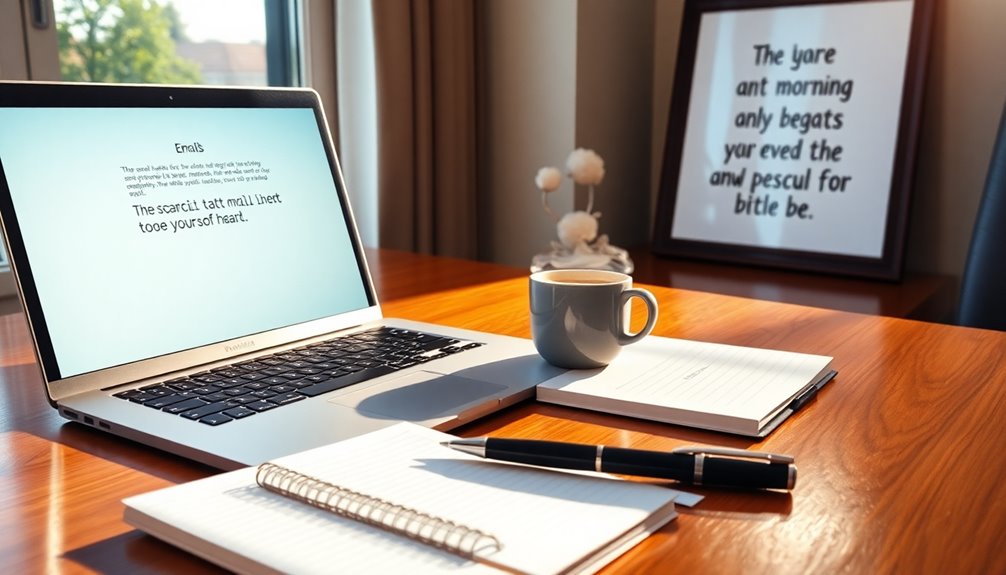
Engaging candidates throughout the hiring process is just as important as expressing gratitude after an interview. You can create a rich candidate experience by utilizing a multi-channel engagement strategy. Reach out through social media, job fairs, and even SMS updates to keep candidates informed and connected.
Technology, like AI chatbots and CRM tools, can help personalize communication, ensuring every interaction feels tailored to the individual.
Focus on personalization by using candidates' names and referencing specific details from their resumes. Tailor your messaging to align with the role they're applying for, showing genuine interest in their skills.
Regular and timely communication is key—prioritize fast reviews and provide updates throughout the hiring process. Sharing a clear timeline keeps candidates engaged and informed. Continuous improvement in your engagement strategies based on candidate feedback is vital for optimizing their experience.
Don't underestimate the power of employee ambassadors. Encourage current employees to connect with candidates and share their experiences, enhancing your company's appeal.
Consider hosting live Q&A sessions or webinars to foster direct interaction. By maintaining consistent, personalized engagement, you'll create a positive candidate experience that makes your company stand out and keeps candidates enthusiastic to join your team.
Building a Positive Impression

Creating a positive impression during the hiring process can greatly influence your chances of landing the job. When you prepare thoroughly, present yourself professionally, engage actively during the interview, and follow up effectively, you set the stage for success.
Here are some key strategies to build that positive impression:
- Research the company: Understand its mission, values, and recent developments to show genuine interest.
- Dress appropriately: Align your attire with the company's dress code to project professionalism. Dressing appropriately can also enhance your confidence during the interview. Establishing a trust creation net worth threshold can lead to better financial stability, which in turn may positively affect your job performance.
- Listen attentively: Engage fully by listening to questions and responding thoughtfully.
- Send a thank-you note: Express your appreciation and reaffirm your interest within 24 hours of the interview.
- Maintain positive body language: Smile, make eye contact, and use enthusiastic gestures to convey confidence.
Frequently Asked Questions
How Long Should a Thank You Email Be?
A thank you email should be concise, ideally just one paragraph with 4-6 sentences.
You want to express your gratitude, reiterate your interest in the position, and touch on key points from your interview.
Keep it structured and easy to read, avoiding lengthy paragraphs.
Should I Send a Thank You Email After Every Interview?
Absolutely, you should send a thank you email after every interview.
Think about it: you've just invested time and effort into presenting yourself, so why not reinforce that connection? A simple thank you not only shows appreciation but also sets you apart from other candidates.
It reminds interviewers of your qualifications while leaving a lasting positive impression. It's a small gesture that can make a significant difference in your job search.
Can I Follow up if I Don't Receive a Response?
Yes, you can definitely follow up if you don't receive a response.
Wait about one to two weeks after your initial application to give the hiring team time to review.
When you do reach out, keep your email brief and express your continued interest in the position.
It's also a good idea to reiterate your qualifications.
If you don't hear back again, consider following up one more time to show persistence.
What Should I Do if I Make a Mistake in My Email?
What if you spot a mistake in your email right after hitting send? Don't panic!
First, assess the error's impact. If it's minor, let it go; everyone makes mistakes.
If it's significant, send a follow-up email acknowledging the error, correcting it, and maintaining professionalism. Apologize briefly, but don't dwell on it.
Most recipients will appreciate your honesty and attention to detail, and it shows you care about clear communication.
Is It Appropriate to Send a Thank You Email for Internships?
Yes, it's absolutely appropriate to send a thank you email after your internship.
This gesture shows your gratitude and helps you maintain a positive relationship with your employer. By expressing appreciation for the guidance and experiences you gained, you leave a lasting impression.
Make sure to send it within 24 to 48 hours, keeping it professional and sincere.
It's a great way to show your enthusiasm and dedication to future opportunities.
Conclusion
In the job search jungle, a simple "thank you" email can be your shining beacon, guiding you toward opportunities. By crafting a thoughtful message, you not only leave a lasting impression but also set yourself apart from the crowd. Timing is key, like a perfectly tuned clock, ensuring your gratitude resonates at just the right moment. With each email, you're not just saying thanks—you're weaving a tapestry of connection that can lead to your dream job. So, don't hesitate!



